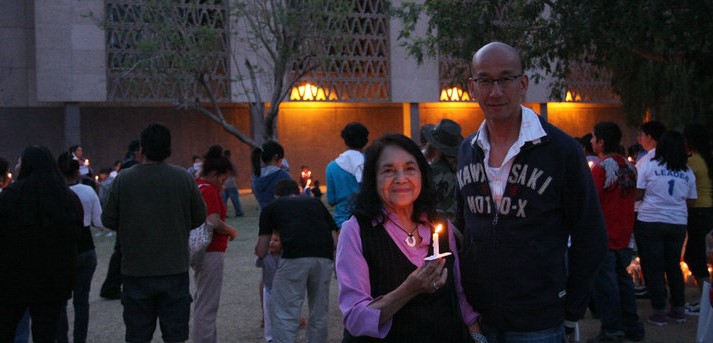¡Si Se Puede! How Cesar Chavez Inspires Us to Challenge COVID-19 Systemic Inequality
April 1, 2020

April 1, 2020
By Shuya Ohno, Managing Director of Campaign Strategy
 Phoenix, AZ – Dolores Huerta at the protest vigil in front of the AZ State Capital in 2010
Phoenix, AZ – Dolores Huerta at the protest vigil in front of the AZ State Capital in 2010
Today, we commemorate Cesar Chavez Day under a heavy cloud of anxiety, uncertainty, and fear. Here in New York City where I live, make-shift hospital tents are being set up in Central Park. Nurses tending to victims of the coronavirus are dying. Covid-19 positive pregnant women are being intubated following emergency deliveries.
The invisible virus has infected the very character that I’ve always loved about this diverse city. Whether it’s complaining about the weather, or lamenting the state of the L Train, or the Knicks, (or the Jets, the Mets, etc., your pick)—in crowded trains or in line for coffee, across class, race, and language divides, New Yorkers have always been able to talk to each other. Now we are no longer those New Yorkers—just strangers who are afraid of each other, avoiding talking each other, not even looking up to make simple eye-contact.
Under this pandemic, Advancement Project National Office’s partner organizations on the ground, across the country are all trying to figure out how to organize when person-to-person and group meetings, essential to the craft of organizing, are simply not possible. Social media is tech-dependent, and there is a real digital divide that makes the very people we are trying to reach almost impossible to contact.
This is just a small aspect of the vicious cycle that the coronavirus will have on our most vulnerable communities of color. As with this New York Times piece details, the pandemic will widen social and economic divides that already make the virus more devastating in poorer communities of color. Hard evidence demonstrate people in poorer, less resourced communities are not only more likely to contract the disease, and more likely to die from it, but the ones who survive are more likely to suffer loss of income as a result of the pandemic. The consequences of this mutually reinforcing cycle will have long-lasting repercussions.
On this Cesar Chavez Day, I think back to everything I learned from people who knew Cesar Chavez, who worked with him, who organized with him under extremely difficult circumstances. People like Eliseo Medina, leading a hunger strike in front of the US Capital in 2013 when he was already 67 years old, who reminded everyone of the importance of commitment and the self-sacrifice it takes to make a difference; people like Marshall Ganz, who seeded a new generation of organizers armed with the knowledge that one of the organizer’s most important roles is to carry a narrative of hope. Most of all, I think of back to Dolores Huerta who will be celebrating her 90th birthday this year. I got to meet her 10 years ago in Arizona when she came back out to Phoenix again and again to help in the fight against SB 1070, the racist anti-immigrant law. I recall one evening, after a huge protest march that Puente organized along with NDLON under the Alto AZ banner, Dolores Huerta stayed outside long into the night, talking to and tending to the immigrant women with Promise AZ who were holding a 100+ day protest vigil in front of the state capital.
For hours, Dolores listened to each and every story, about the fear and anxiety that pervaded the community—fear that in middle of night will come a bang on the door by ICE agents, or that around the next corner, Joe Arpaio and his deputies are lying in wait. She listened and counseled, and she inspired. She held her lit candle in her small hand and shared her stories about the impossible challenges that she and Cesar Chavez and the UFW had overcome, the improbable victories that they had won. That night, she was the embodiment of the chant that she started in 1972, that still reverberates today—a simple affirmation of hope that we need to say to ourselves now, in our neighborhoods, in our hospitals, and spread through all our communities. ¡Si Se Puede! Yes. Yes, we can.

Shuya Ohno is the Managing Director of Campaign Strategy at Advancement Project National Office. With over twelve years of experience in electoral and advocacy campaigns at the local, state, and national levels, Shuya brings commitment to movement building that integrates organizing and communications to build capacity at the grassroots to bring campaigns to scale.